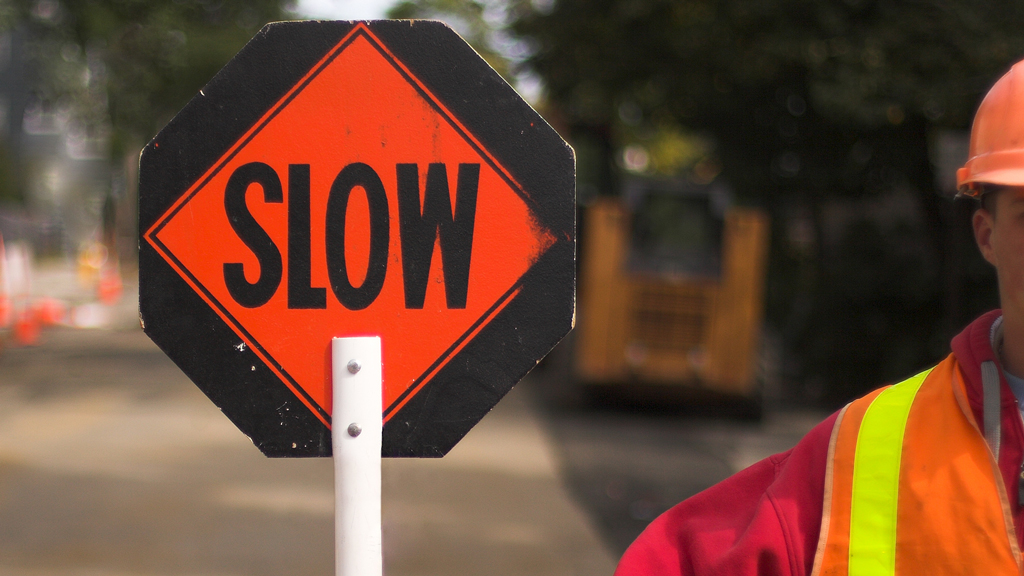WorkSafeBC (WSBC) recently approved Universal Health and Safety Inc. of Burnaby as the second provider of traffic control training and certification in the province.
Until the end of June 2021, the BC Construction Safety Alliance (BCCSA) had an almost 20-year run as the only traffic control training provider in B.C.
Traffic control persons (TCPs, or flaggers) who work in high-risk locations in B.C. — typically roads, highways and large parking lots — must be trained according to WSBC regulations.
“It’s not an easy job,” said Joe Wrobel, president of JPW Earthworks Inc. in Vernon. “Flaggers must protect not just their work crews, but also drivers and, of course, themselves.”
Wrobel, who has employed and supplied TCPs and flagged himself in emergencies, says driver behaviour can never be taken for granted.
“You never know what they’re going to do next,” he said.
The job has become more difficult over the years because there are more cars on the road.
“At the same time, TCP training has improved and there are more and better resources available to flaggers,” Wrobel said.
Universal’s TCP training program, which is two-days of classroom and practical, is one of 45 such programs the company offers in such occupations as fall protection, WHMIS training, occupational first aid and mobile equipment training.
Universal’s move into TCP training has been in the works for the past two years, says corporate development manager Francis McAllorum.
“There aren’t enough certified TCPs in B.C.,” he said. “And because more road and infrastructure construction is expected in the province, more traffic control personnel will be needed.”
In business since 2015, Universal has been growing rapidly. It has training facilities in Burnaby, Victoria, Vernon and Langley and plans to expand into the rest of B.C. and other provinces.
Universal will certify both TCPs and the instructors who train them. It also provides traffic control personnel to companies who wish to employ them, through multiple sister companies within the Universal Group. McAllorum says Universal certified 75 TCPs in the training program’s first 30 days.
“Plus we’ve certified three instructors,” he said. “Our goal to have certified 15 by end of 2021 and a total of about 40 instructors by mid-2022.”
Some of the instructors will be employees and some will be independent contractors.
BCCSA, for its part, has been a TCP training provider since 2003.
In that time, says Lui Garcea, director of its training program, more than 103,000 flaggers have successfully passed the two-day training program and over 15,000 have requalified. In B.C. TCPs who pass the test receive a certificate that is valid for three years, after which they must requalify.
BCCSA’s TCP training is carried out by instructors who are independent contractors.
“We have 32 instructors now and are in the process of training eight more,” said Garcea. “There are instructors in all areas of the province, from the Lower Mainland up to Fort Nelson and Terrace, down to Cranbrook and everywhere in between, including remote areas.”
In addition to the independent contractor-instructors and Garcea, BCCSA has two full-time staff positions: TCP co-ordinator and quality assurance specialist.
TCP training is not standardized across Canada, with diversity the rule, not the exception.
Sheila Sergy, executive director of Northern Safety Network Yukon (NSNY), Yukon’s occupational health and safety organization, says Yukon Traffic Control Training is a two-day course given by three instructors who are independent contractors.
“The road construction and repair season in Yukon is short and intense,” Sergy said. “Demand for flagger training is seasonal, but we offer at least two courses per month, and train up to a couple of hundred TCPs per year.”
The TCP training curriculum was developed jointly by NSNY, the Yukon Workers’ Compensation Health and Safety Board and Yukon College (now Yukon University).
Unlike British Columbia, NSNY is the only organization in Yukon that provides TCP training.
The Newfoundland and Labrador Construction Safety Association (NLCSA) offers two one-day TCP training courses: Traffic Control Person Level 1 (in-class and virtual) and Traffic Control Person Level 2, for supervisors.
Courses are offered in St. Johns, Corner Brook and Gander by nine instructors, all of whom are NLCSA employees.
Workplace NL, which administers Newfoundland’s workers’ compensation system, sets the training standards and the curriculum in consultation with industry stakeholders and the NLCSA.
“In addition to us, there are private organizations in Newfoundland that do traffic control training,” said NLCSA CEO Jackie Manuel. “All together there are about a dozen for-profit companies that do it.”
Manuel says there needs to be better harmonization of TCP training standards across Canada.
“There’s too much variation in standards and curricula between jurisdictions,” she said.











Recent Comments
comments for this post are closed